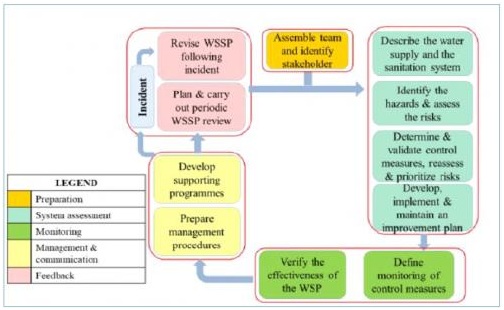

2nd March 2022 (6 Topics)
Context
The Brahamandiha water and sanitation safety plan was launched in 2021 for the Brahmandiha Gram Panchayat of Bankura district in West Bengal.
About
About Water and Sanitation Safety Plan (WSSP):
- WSSP is a key resource to emphasise the combined issues of water and sanitation.
- WSSP is an internationally recognised practice for assessing and managing public health risks related to water supply and sanitation systems.
- It is a risk assessment tool to safely manage water supply and sanitation systems.
- It considers multiple factors such as behavioural, managerial and technological to prevent exposure to hazardous events affecting water and sanitation quality.
- WSSP also acts as a monitoring tool and provides control on different factors throughout the water supply and sanitation chain.
- India’s first rural WSSPwas prepared by a Kolkata-based non-profit called SIGMA Foundation, with the support of the Government of West Bengal and the Asian Development Bank (ADB).
|
Water and Sanitation Safety Plan (WSSP) Process: The WSSP preparation involved a five-fold process:
|
About Centre for Science and Environment (CSE):
- Centre for Science and Environment (CSE) is a public interest research and advocacy organisation based in New Delhi.
- CSE researches into, lobbies for and communicates the urgency of development that is both sustainable and equitable.
- CSE’s Rural Water and Sanitation programme works with its sights on three key thematic areas:
- Equitable access to clean water and sanitation for all:
- To ensure this, the programme initiative focuses on alternative paradigms of water supply and sanitation, such as rainwater harvesting, decentralised water supply, etc.
- The effort is to develop strategies for building technical capacity to implement projects on these alternative paradigms.
- Alternative wastewater management technologies for pollution control:
- Designed to find ways to combat the problem of pollution and resultant health burden on the poor, this initiative acknowledges the inter-linkages between water and sanitation strategies.
- It focuses on research and evidence-based advocacy on decentralised wastewater management technologies to make them affordable and sustainable.
- Policy guidelines for moving towards sustainable rural sanitation:
- This involves researching and reporting on, and documentation of, best practices on rural sanitation, so that water and waste management strategies work for livelihood and health.
More Articles



